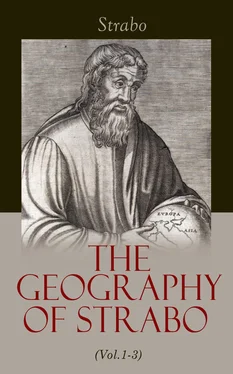Strabo - The Geography of Strabo (Vol.1-3)
Здесь есть возможность читать онлайн «Strabo - The Geography of Strabo (Vol.1-3)» — ознакомительный отрывок электронной книги совершенно бесплатно, а после прочтения отрывка купить полную версию. В некоторых случаях можно слушать аудио, скачать через торрент в формате fb2 и присутствует краткое содержание. Жанр: unrecognised, на английском языке. Описание произведения, (предисловие) а так же отзывы посетителей доступны на портале библиотеки ЛибКат.
- Название:The Geography of Strabo (Vol.1-3)
- Автор:
- Жанр:
- Год:неизвестен
- ISBN:нет данных
- Рейтинг книги:3 / 5. Голосов: 1
-
Избранное:Добавить в избранное
- Отзывы:
-
Ваша оценка:
- 60
- 1
- 2
- 3
- 4
- 5
The Geography of Strabo (Vol.1-3): краткое содержание, описание и аннотация
Предлагаем к чтению аннотацию, описание, краткое содержание или предисловие (зависит от того, что написал сам автор книги «The Geography of Strabo (Vol.1-3)»). Если вы не нашли необходимую информацию о книге — напишите в комментариях, мы постараемся отыскать её.
The Geography of Strabo (Vol.1-3) — читать онлайн ознакомительный отрывок
Ниже представлен текст книги, разбитый по страницам. Система сохранения места последней прочитанной страницы, позволяет с удобством читать онлайн бесплатно книгу «The Geography of Strabo (Vol.1-3)», без необходимости каждый раз заново искать на чём Вы остановились. Поставьте закладку, и сможете в любой момент перейти на страницу, на которой закончили чтение.
Интервал:
Закладка:
5. From the Lao the first city is the Temesa 2104of the Bruttii, which at present is called Tempsa. It was founded by the Ausonians; afterwards the Ætolians, under the command of Thoas, gained possession of it. These were expelled by the Bruttii; Hannibal and the Romans have overthrown the Bruttii. 2105In the vicinity of Temesa is the Heroum of Polites, one of the companions of Ulysses. It is surrounded by a thick grove of wild olives. He was treacherously slain by the barbarians, and became in consequence very wrathful, and his shade so tormented the inhabitants that they submitted to pay him a tribute, according to the direction of a certain oracle. Thus it became a proverb amongst them, “Let no one offend the hero of Temesa,” for they said that [for a long time he 2106] had tormented them. But when the Epizephyrian Locrians took the city, they feign that Euthymus the pugilist went out against him, and having overcome him in fight, constrained him to free the inhabitants from tribute. 2107They say that the poet intended this Temesa, and not the Tamassus 2108in Cyprus, (for it is said that the words are suitable to either, 2109) when he sings,
[Pg 382]
[CAS. 256]
“in quest of brass
To Temesa.” 2110
and certain copper-mines are pointed out near to the place, which are now exhausted. Contiguous to it is Terina, 2111which Hannibal destroyed, when he found he could no longer retain it; at the time when he took refuge in the country of the Bruttii. 2112Next in order comes Cosentia, 2113the metropolis of the Bruttii. A little above it is Pandosia, which is strongly fortified, before which Alexander the Molossian king was overthrown. This prince was led astray by the oracle of Dodona, which commanded him to avoid Acheron and Pandosia; 2114for places with names like these being pointed out in Thesprotia, caused him to lose his life 2115here. The position has three summits, and the river Acheron flows by it. He was also mistaken in another oracle,
“O Pandosia, thou three-topp’d hill,
Hereafter many people thou shalt kill;”
for he thought that it foreshowed the destruction of his enemies, and not of his own people. They say that Pandosia 2116was formerly the residence of the Œnotrian kings. After Cosentia is Hipponium, 2117founded by the Locrians. 2118The Romans took it from the Bruttii, who were in possession of it at a subsequent period, and changed the name into Vibo-Valentia. 2119And because the meadows in its vicinity are luxuriant and full of flowers, it is supposed that Proserpine came over from Sicily to gather them, and from thence the custom among women of this city, to gather flowers and plait garlands, prevailed to such an extent, that they now think it shameful to wear purchased garlands at the festivals. 2120It also possesses a harbour 2121made by Agathocles, 2122the tyrant of Sicily, when he was in possession of the town. On sailing hence to the Portus Herculis, 2123we come to the point where the headlands of Italy, as they stretch towards the Strait [of Sicily], begin to turn westward. In this voyage we pass Medma, 2124a city of the same Locrians, 2125which bears the name of a copious fountain, and possessing at a short distance a naval station, called Emporium. 2126Very nigh is the river Metauro, 2127as also a naval station bearing the same name. 2128The Lipari Isles lie off this coast; they are distant 200 stadia from the strait. They say that they are the islands of Æolus, of whom the poet makes [Pg 384] [CAS. 257] mention in the Odyssey. 2129They are seven in number, and are all easily distinguished both from Sicily and the coast of the continent about Medma. We will speak of them in particular when we describe Sicily. After the river Metaurus, there is another Metaurus. 2130Next in order is Scyllæum, an elevated cliff nearly surrounded by the sea. But connected with the mainland by a low isthmus easily accessible on either side, which Anaxilaus, the tyrant of Rhegium, fortified against the Tyrrheni, and formed a commodious haven, and thus prevented the pirates from passing through the strait. Next to the Scyllæan promontory was that of Cænys, distant from Medma 250 stadia. It is the last headland, and forms the narrowest part of the Strait [of Sicily], being opposite to Cape Pelorus on the Sicilian side, which is one of the three points which give to that island the form of a triangle. Its aspect is towards the rising of the sun in summer, whilst that of Cænys looks towards the west. Indeed they both seem to have diverged from the general line of coast in order to stand out opposite each other. 2131From Cænys to the Posidonium 2132[and] the Columna Rheginorum, 2133the narrow part of the strait stretches as much as 6 stadia, the shortest passage across the strait is a little more. From the Columna [Rheginorum] to Rhegium, where the strait begins to widen, is a hundred [stadia] as you advance in a direction towards the exterior and eastern sea, which is called the sea of Sicily.
6. Rhegium 2134was founded by certain Chalcidenses, who, as they say, were decimated as an offering to Apollo in a time of scarcity, by order of an oracle, and afterwards removed hither from Delphi, taking with them certain others from home. As Antiochus says, the Zanclæans sent for the Chalcidenses, and appointed Antimnestus chief over them. Certain fugitives of the Messenians of Peloponnesus accompanied this colony, who had been compelled to fly by those who refused to give satisfaction to the Lacedæmonians for the violation 2135of the virgins at Limnæ, whom they had abused when attending the religious festival, and had slain those who assisted them. However when the fugitives had removed to Macistus, they sent to the oracle complaining against Apollo and Diana for suffering these things to happen notwithstanding they so greatly honoured them, and inquiring how the devoted might be saved. Apollo commanded to send them with the Chalcidenses to Rhegium, and to be grateful, therefore, to his sister Diana for that they were not lost but saved, as they should not be destroyed with their country, which would be annihilated shortly after by the Spartans. 2136They acted in accordance with the oracle, and thus it was that the rulers of the Rhegini were all of Messenian race until the time of Anaxilaus.
Antiochus asserts that anciently the whole of this district was inhabited by Sicilians and Morgetes; and that they [Pg 386]
[CAS. 258] afterwards passed into Sicily when they were expelled by the Œnotri. Some say that Morgantium 2137thus received its name from the Morgetes. But the city of the Rhegini became very powerful, and possessed many dependent settlements. It has always been a bulwark for us against the island [of Sicily], and, indeed, has recently served to that purpose when Sextus Pompeius alienated Sicily. 2138It was called Rhegium either, as Æschylus says, because of the convulsion which had taken place in this region; for Sicily was broken from the continent by earthquakes,
“Whence it is called Rhegium.” 2139
Others, 2140as well as he, have affirmed the same thing, and adduce as an evidence that which is observed about Ætna, and the appearances seen in other parts of Sicily, the Lipari and neighbouring islands, and even in the Pithecussæ, with the whole coast beyond them, which prove that it was not unlikely that this convulsion had taken place. But now these mouths being opened, through which the fire is drawn up, and the ardent masses and water poured out, they say that the land in the neighbourhood of the Strait of Sicily rarely suffers from the effects of earthquakes; but formerly all the passages to the surface being blocked up, the fire which was smouldering beneath the earth, together with the vapour, occasioned terrible earthquakes, and the regions, being disturbed by the force of the pent-up winds, sometimes gave way, and being rent received the sea, which flowed in from either side; and thus were formed both this strait and the sea which surrounds the other islands in the neighbourhood. For Prochyta 2141and the Pithecussæ, as well as Capreæ, Leucosia, the Sirenes, and the Œnotrides, are but so many detached fragments from the continent, but other islands have risen from the bottom of the sea, a circumstance which frequently occurs in many places; for it is more reasonable to think that the islands in the midst of the sea have been raised up from the bottom, and that those which lie off headlands and are separated merely by a strait were broken off from them. Still it is beside our purpose to investigate thoroughly whether the name were given to the city for these causes, or whether it were named by the Samnites from the Latin word regium, which signifies royal, on account of its importance, 2142
Читать дальшеИнтервал:
Закладка:
Похожие книги на «The Geography of Strabo (Vol.1-3)»
Представляем Вашему вниманию похожие книги на «The Geography of Strabo (Vol.1-3)» списком для выбора. Мы отобрали схожую по названию и смыслу литературу в надежде предоставить читателям больше вариантов отыскать новые, интересные, ещё непрочитанные произведения.
Обсуждение, отзывы о книге «The Geography of Strabo (Vol.1-3)» и просто собственные мнения читателей. Оставьте ваши комментарии, напишите, что Вы думаете о произведении, его смысле или главных героях. Укажите что конкретно понравилось, а что нет, и почему Вы так считаете.












![Anne Blunt - A Pilgrimage to Nejd, the Cradle of the Arab Race. Vol. 2 [of 2]](/books/750183/anne-blunt-a-pilgrimage-to-nejd-the-cradle-of-the-thumb.webp)